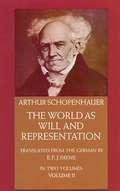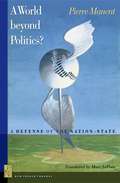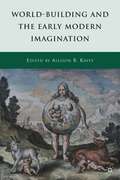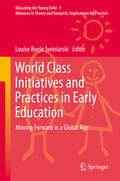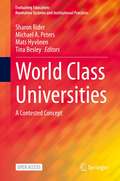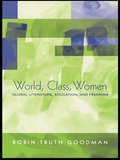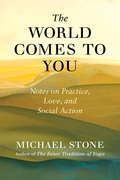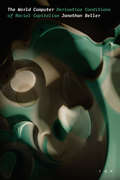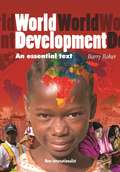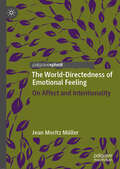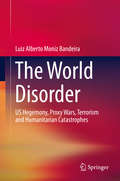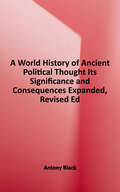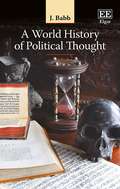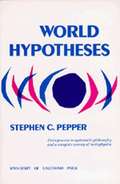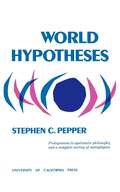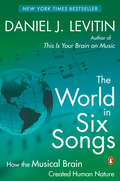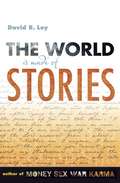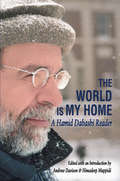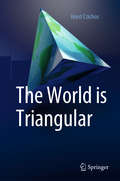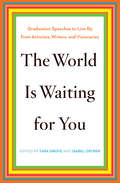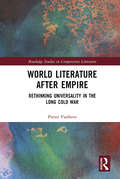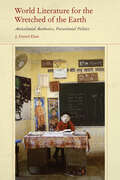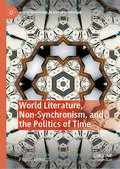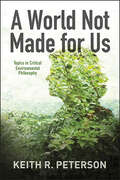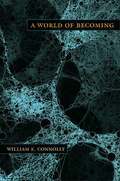- Table View
- List View
The World as Will and Representation, Vol. 2
by Arthur SchopenhauerVolume 2 of the definitive English translation of one of the most important philosophical works of the 19th century, the basic statement in one important stream of post-Kantian thought. Corrects nearly 1,000 errors and omissions in the older Haldane-Kemp translation. For the first time, this edition translates and locates all quotes and provides full index.
A World Beyond Politics?: A Defense Of The Nation-state
by Pierre Manent Marc A. LePainWe live in the grip of a great illusion about politics, Pierre Manent argues in A World beyond Politics? It's the illusion that we would be better off without politics--at least national politics, and perhaps all politics. It is a fantasy that if democratic values could somehow detach themselves from their traditional national context, we could enter a world of pure democracy, where human society would be ruled solely according to law and morality. Borders would dissolve in unconditional internationalism and nations would collapse into supranational organizations such as the European Union. Free of the limits and sins of politics, we could finally attain the true life.
World-Building and the Early Modern Imagination
by Allison B. KaveyThe early modern period was rife with attempts to re-imagine the world and the human place within it. This volume looks at natural philosophers, playwrights, historians, and other figures in the period 1500-1700 as a means of accessing the plethora of world models that circulated in Europe during this era.
World Class Initiatives and Practices in Early Education
by Louise Boyle SwiniarskiThis book offers current international initiatives, developed for working with children from "Birth to Eight" by a diverse group of noted professional authors. Their readings present an overview of early education as it evolved from the Froebelian kindergarten to today's practices in various Early Education settings around the globe. The international voices of the authors represent a balanced perspective of happenings in various nations and lend a conversational approach to each chapter. The chapters analyze the Universal Preschool Education movement promoted by various countries, states, and agencies; examine model curriculum programs in a variety of teaching/learning settings; and identify directions the community can take in promoting effective early education programs. Particular attention is given to key issues and concerns faced by practitioners and families world-wide. Studies reveal successful approaches to bilingual education in a Chilean kindergarten, research findings on gender differences in primary school girls for learning science in Wales, literacy development strategies for teaching in UK multicultural classrooms and childhood centres, the process of integration special education with early childhood practices in China, and exemplars of community outreach to improve the well being of children through advocacy for governmental changes in early education policies and professional development. This book is for everyone interested in the well being of young children moving forward in a global age to meet the challenges of early citizenship in their world.
World Class Universities: A Contested Concept (Evaluating Education: Normative Systems and Institutional Practices)
by Michael A. Peters Sharon Rider Mats Hyvönen Tina BesleyThis open access book focuses on the dimensions of the discourse of 'The World Class University', its alleged characteristics, and its policy expressions. It offers a broad overview of the historical background and current trajectory of the world-class-university construct. It also deepens the theoretical discussion, and points a way forward out of present impasses resulting from the pervasive use and abuse of the notion of "world-class" and related terms in the discourse of quality assessment. The book includes approaches and results from fields of inquiry not otherwise prominent in Higher Education studies, including philosophy and media studies, as well as sociology, anthropology, educational theory.The growing impact of global rankings and their strategic use in the restructuring of higher education systems to increase global competitiveness has led to a ‘reputation race’ and the emergence of the global discourse of world class universities. The discourse of world class universities has rapid uptake in East Asian countries, with China recently refining its strategy. This book provides insights into this process and its future development.
World, Class, Women: Global Literature, Education, and Feminism
by Robin Truth GoodmanWorld, Class, Women begins the extraordinarily important task of bringing a postcolonial, feminist voice to critical pedagogy and, by extension explores how current debates about education could make a contribution to feminist thought. Robin Truth Goodman deftly weaves together the disciplines of literature, postcolonialism, feminism, and education in order to theorize how the shrinking of the public sphere and the rise of globalization influence access to learning, what counts as knowledge, and the possibilities of a radical feminism.
The World Comes to You: Notes on Practice, Love, and Social Action
by Michael StoneShort, potent lessons on living the yoga and Buddhist paths in the midst of everyday life—by teacher Michael Stone.These fresh, intimate teachings by innovative dharma and yoga teacher Michael Stone offer essential wisdom for living with compassion and responsiveness in the midst of everyday life in an imbalanced world.Stone reminds us in a clear and encouraging way that as we turn wholeheartedly toward what is, with our bodies, hearts, and minds, we discover innate resilience and enliven our creative ability to respond. Practice, he shows, is always both internal and external.
The World Computer: Derivative Conditions of Racial Capitalism (Thought in the Act)
by Jonathan BellerIn The World Computer Jonathan Beller forcefully demonstrates that the history of commodification generates information itself. Out of the omnipresent calculus imposed by commodification, information emerges historically as a new money form. Investigating its subsequent financialization of daily life and colonization of semiotics, Beller situates the development of myriad systems for quantifying the value of people, objects, and affects as endemic to racial capitalism and computation. Built on oppression and genocide, capital and its technical result as computation manifest as racial formations, as do the machines and software of social mediation that feed racial capitalism and run on social difference. Algorithms, derived from for-profit management strategies, conscript all forms of expression—language, image, music, communication—into the calculus of capital such that even protest may turn a profit. Computational media function for the purpose of extraction rather than ameliorating global crises, and financialize every expressive act, converting each utterance into a wager. Repairing this ecology of exploitation, Beller contends, requires decolonizing information and money, and the scripting of futures wagered by the cultural legacies and claims of those in struggle.
World Development
by Barry BakerThis essential text addresses the growing need for a dedicated coursebook for students and teachers of world development. As the source of the most respected international magazine on world development issues, the publishers have created a highly credible and accessible text to illuminate this increasingly important subject. Thematic chapters cover globalization, population, the millennium development goals, and eleven other vital topics. It distils them down to their essentials, outlining contending viewpoints and offering background material and case studies, along with high-quality color photographs, charts, and graphs. Barry Baker is a geography teacher in Oxford, United Kingdom.
The World-Directedness of Emotional Feeling: On Affect and Intentionality
by Jean Moritz MüllerThis book engages with what are widely recognized as the two core dimensions of emotion. When we are afraid, glad or disappointed, we feel a certain way; moreover, our emotion is intentional or directed at something: we are afraid of something, glad or disappointed about something. Connecting with a vital strand of recent philosophical thinking, Müller conceives of these two aspects of emotion as unified. Examining different possible ways of developing the view that the feeling dimension of emotion is itself intentional, he argues against the currently popular view that it is a form of perception-like receptivity to value. Müller instead proposes that emotional feeling is a specific type of response to value, an affective ‘position-taking’. This alternative conceives of emotional feeling as intimately related to our cares and concerns. While situating itself within the analytic-philosophical debate on emotion, the discussion crucially draws on ideas from the early phenomenological tradition and thinks past the theoretical strictures of many contemporary approaches to this subject. The result is an innovative view of emotional feeling as a thoroughly personal form of engagement with value.
The World Disorder: US Hegemony, Proxy Wars, Terrorism and Humanitarian Catastrophes
by Luiz Alberto Moniz BandeiraThis book offers a historical analysis of the geopolitical and geoeconomic competition between the USA and Russia, which has recently heated up again due to the eastward expansion of NATO. The analysis departs from an exploration of the USA’s foreign policy and geopolitical ambitions by illustrating the influence of Wall Street and the military-industrial complex on the country’s political decision-making. The historical review covers a wide timespan, from the Second World War and the birth of NATO, to the wars against Iraq and Afghanistan, to the rebellions that erupted in Eurasia, Northern Africa and the Middle East in the 2010’s, as well as the wars in the Ukraine and in Syria. By doing so, it reveals the influence of US neocons, the US intelligence services and the military complex on the Arab Spring, the Color Revolutions and the armed conflicts in Ukraine and Syria. Ultimately, the book depicts a new era of worldwide instability and disorder, dominated by violence and arbitrariness.
A World History of Ancient Political Thought: Its Significance and Consequences
by Antony BlackThis book examines the political thought of China, Greece, Israel, Rome, India, Iran, Egypt, Mesopotamia, and also early Christianity, from prehistory to c. 200 CE. Each of these had its priorities, based on a religious and philosophical perspective. This led to different ideas about who should govern, how to govern, and what government was for. In most cultures, sacred monarchy was the norm, but this ranged from absolute to conditional authority. 'The people' were recipients of royal (and divine) beneficence. Justice, the rule of law, and meritocracy were generally regarded as fundamental. In Greece and Rome, democracy and liberty were born, while in Israel the polity was based on covenant and the law. Confucius taught humaneness, Mozi and Christianity taught universal love; Kautilya and the Chinese 'Legalists' believed in realpolitik and an authoritarian state. <p><p>The conflict between might and right was resolved in many different ways. Chinese, Greek and Indian thinkers reflected on the origin and purposes of the state. Status and class were embedded in Indian and Chinese thought, the nation in Israelite thought. On the other hand, the Stoics and Cicero saw humanity as a single unit. Political philosophy, using logic, evidence and dialectic, was invented in China and Greece, statecraft in China and India, political science in Greece. Plato and Aristotle, followed by Polybius and Cicero, started 'western' political philosophy. This book covers political philosophy, religious ideology, constitutional theory, social ethics, official and popular political culture.
A World History of Political Thought
by J. BabbIts an outstanding and innovative work with profound significance for the study of the history of political thought, providing a wide-ranging, detailed and global overview of political thought from 600 BC to the 21st century. Treating both western and non-western systems of political thought as equal and placing them as they should be; side by side.
World Hypotheses: A Study in Evidence
by Stephen C. Pepper"World hypotheses" correspond to metaphysical systems, and they may be systematically judged by the canons of evidence and corroboration. In setting forth his root-metaphor theory and examining six such hypotheses--animism, mysticism, formism, mechanism, contextualism, and organicism--Pepper surveys the whole field of metaphysics. Because this book is an analytical study, it stresses issues rather than men. It seeks to exhibit the sources of these issues and to show that some are unnecessary; that the rest gather into clusters and are interconnected in systems corresponding closely to the traditional schools of philosophy. The virtue of the root-metaphor method is that it puts metaphysics on a purely factual basis and pushes philosophical issues back to the interpretation of evidence. This book was written primarily as a contribution to the field, but its plan excellently suits it for use as a text in courses in metaphysics, types of philosophical theory, or present tendencies in philosophy.
World Hypotheses: A Study in Evidence
by Stephen C. Pepper"World hypotheses" correspond to metaphysical systems, and they may be systematically judged by the canons of evidence and corroboration.In setting forth his root-metaphor theory and examining six such hypotheses—animism, mysticism, formism, mechanism, contextualism, and organicism—Pepper surveys the whole field of metaphysics. Because this book is an analytical study, it stresses issues rather than men. It seeks to exhibit the sources of these issues and to show that some are unnecessary; that the rest gather into clusters and are interconnected in systems corresponding closely to the traditional schools of philosophy. The virtue of the root-metaphor method is that it puts metaphysics on a purely factual basis and pushes philosophical issues back to the interpretation of evidence.This book was written primarily as a contribution to the field, but its plan excellently suits it for use as a text in courses in metaphysics, types of philosophical theory, or present tendencies in philosophy.
The World in Six Songs
by Daniel J. LevitinThe author of the New York Times bestseller This Is Your Brain on Music reveals music's role in the evolution of human culture-and "will leave you awestruck" (The New York Times) Daniel J. Levitin's astounding debut bestseller, This Is Your Brain on Music, enthralled and delighted readers as it transformed our understanding of how music gets in our heads and stays there. Now in his second New York Times bestseller, his genius for combining science and art reveals how music shaped humanity across cultures and throughout history. Dr. Levitin identifies six fundamental song functions or types-friendship, joy, comfort, religion, knowledge, and love-then shows how each in its own way has enabled the social bonding necessary for human culture and society to evolve. He shows, in effect, how these "six songs" work in our brains to preserve the emotional history of our lives and species. Dr. Levitin combines cutting-edge scientific research from his music cognition lab at McGill University and work in an array of related fields; his own sometimes hilarious experiences in the music business; and illuminating interviews with musicians such as Sting and David Byrne, as well as conductors, anthropologists, and evolutionary biologists. The World in Six Songs is, ultimately, a revolution in our understanding of how human nature evolved-right up to the iPod. Read Daniel Levitin's posts on the Penguin Blog.
The World Is Made of Stories
by David R. LoyIn this dynamic and utterly novel presentation, David Loy explores the fascinating proposition that the stories we tell--about what is and is not possible, about ourselves, about right and wrong, life and death, about the world and everything in it--become the very building blocks of our experience and of reality itself. Loy uses an intriguing mixture of quotations from familiar and less-familiar sources and brief stand-alone micro-essays, engaging the reader in challenging and illuminating dialogue. As we come to see that the world is made--in a word--of stories, we come to a richer understanding of that most elusive of Buddhist ideas: shunyata, the "generative emptiness" that is the all-pervading quality inherent to all mental and physical forms in our ever-changing world. Reminiscent of Zen koans and works of sophisticated poetry, this book will reward both a casual read and deep reflection.
The World is My Home: A Hamid Dabashi Reader
by Andrew Davison & Himadeep MuppidiAs recent events indicate, Iranian, Middle Eastern, and Islamic politics more broadly have been deeply influential in world affairs. Hamid Dabashi has been a highly visible and prominent commentator on these affairs, explaining, interpreting, and providing a critical perspective. This volume gathers together his most influential and insightful writings. As one of the foremost contemporary public intellectuals and scholars of our time, Dabashi's interests and writings span subjects ranging from Islamic philosophy and political ideology to Iranian art and Persian literature, from Sufism and Orientalism to Iranian and world cinema and contemporary Arab and Muslim visual arts; and from postcolonial theory and globalization to imperialism and public affairs. There is a direct connection between his theoretical innovations and the angle of his public interventions on the urgent global issues of the day. This book brings together some of his most important writings, especially those that offer new ways of understanding Islam, Iran, Islamist ideology, global art, and the condition of global modernity. The book shows the underlying conceptual themes that unify Dabashi's wide-ranging and brilliantly insightful corpus. Dabashi combines deep knowledge of the subject matter about which he writes, and highly refined sociological, hermeneutical, and cultural interpretive skills, moving far beyond the limiting, distorted, and intellectually stifling character of reigning absolutist conventions. He places existing authoritative frameworks under close scrutiny in order to produce novel and penetrating insights. These essays reflect historical and geographical worlds that are best viewed when Hamid Dabashi's work is read as a whole, which this one- volume work makes possible for the first time.
The World is Triangular
by Horst CzichosThis book gives a short presentation of the triad philosophy–physics–technology against the background of the common origin in ancient times. The emergence of the book has been described in the foreword of the first edition. The present second edition of the book is updated and extended, whereby new physical research results and technological innovations were included: - The physics of space and time after the experimental detection of gravitational waves (Nobel Prize for Physics 2017). - The New International System of Units (SI) for Physics and Technology which is completely based on natural constants and entered into force on World Metrology Day, 20 May 2019. - Actual overview of basic technologies: Material, Energy, Information. - Technologies for the “Digital World” of information and communication. - Mechatronic and Cyber-physical systems for Industry 4.0. The significance of technology for the world in the 21st century is discussed in the final section of the book.
The World Is Waiting for You: Graduation Speeches to Live By from Activists, Writers, and Visionaries
by Tara Grove Isabel OstrerWith contemporary graduation speeches that dissect the world as it is and imagine what it could be, The World Is Waiting for You brings forth eighteen courageous figures who have dared to transform the podium into a pulpit for championing peace, justice, protest, and a better world."The voices of conformity speak so loudly. Don't listen to them," acclaimed author and award-winning journalist Anna Quindlen cautioned graduates of Grinnell College. Jazz virtuoso and educator Wynton Marsalis advised new Connecticut College alums not to worry about being on time, but rather to be in time-because "time is actually your friend. He don't come back because he never goes away." And renowned physician and humanitarian Paul Farmer revealed at the University of Delaware his remarkable discovery-the new disease Empathy Deficit Disorder-and assured the commencers it could be cured.The prescient, fiery feminism of Gloria Steinem sits parallel to that of celebrated writer Ursula K. Le Guin, who asks, "What if I talked like a woman right here in public?" Nobelist and novelist Toni Morrison sagaciously ponders how people centuries from now will perceive our current times, and Pulitzer Prize winner Barbara Kingsolver asks those born into the Age of Irony to "imagine getting caught with your Optimism hanging out" and implores us always to act and speak the truth.The World Is Waiting for You speaks to anyone who might take to heart the advice of Planned Parenthood president Cecile Richards-"life as an activist, troublemaker, or agitator is a tremendous option and one I highly recommend"-and is the perfect gift for all who are ready to move their tassels to the left.
World Literature After Empire: Rethinking Universality in the Long Cold War (Routledge Studies in Comparative Literature)
by Pieter VanhoveThis book makes the case that the idea of a "world" in the cultural and philosophical sense is not an exclusively Western phenomenon. During the Cold War and in the wake of decolonization a plethora of historical attempts were made to reinvent the notions of world literature, world art, and philosophical universality from an anticolonial perspective. Contributing to recent debates on world literature, the postcolonial, and translatability, the book presents a series of interdisciplinary and multilingual case studies spanning Europe, the United States, and China. The case studies illustrate how individual anti-imperialist writers and artists set out to remake the conception of the world in their own image by offering a different perspective centered on questions of race, gender, sexuality, global inequality, and class. The book also discusses how international cultural organizations like the Afro-Asian Writers’ Bureau, UNESCO, and PEN International attempted to shape this debate across Cold War divides.
World Literature for the Wretched of the Earth: Anticolonial Aesthetics, Postcolonial Politics
by J. Daniel ElamWorld Literature for the Wretched of the Earth recovers a genealogy of anticolonial thought that advocated collective inexpertise, unknowing, and unrecognizability. Early-twentieth-century anticolonial thinkers endeavored to imagine a world emancipated from colonial rule, but it was a world they knew they would likely not live to see. Written in exile, in abjection, or in the face of death, anticolonial thought could not afford to base its politics on the hope of eventual success, mastery, or national sovereignty. J. Daniel Elam shows how anticolonial thinkers theorized inconsequential practices of egalitarianism in the service of an impossibility: a world without colonialism. Framed by a suggestive reading of the surprising affinities between Frantz Fanon’s political writings and Erich Auerbach’s philological project, World Literature for the Wretched of the Earth foregrounds anticolonial theories of reading and critique in the writing of Lala Har Dayal, B. R. Ambedkar, M. K. Gandhi, and Bhagat Singh. These anticolonial activists theorized reading not as a way to cultivate mastery and expertise but as a way, rather, to disavow mastery altogether. To become or remain an inexpert reader, divesting oneself of authorial claims, was to fundamentally challenge the logic of the British Empire and European fascism, which prized self-mastery, authority, and national sovereignty. Bringing together the histories of comparative literature and anticolonial thought, Elam demonstrates how these early-twentieth-century theories of reading force us to reconsider the commitments of humanistic critique and egalitarian politics in the still-colonial present.
World Literature, Non-Synchronism, and the Politics of Time (New Comparisons in World Literature)
by Filippo MenozziDrawing on a Marxist concept of world literature, this book is a study of the manipulations of time in contemporary anglophone fiction from Africa and South Asia. Through critical work and literary reading, this research explores the times other than the present that seem to haunt an era of capitalist globalisation: nostalgic feelings about bygone ideals of identity and community, appeals to Golden Ages, returns of the repressed and anxious anticipations of global extinction and catastrophe. The term non-synchronism explored in this book captures these dislocations of the present, while offering a critical lens to grasp the politics of time of an era marked by the continuing expansion of capitalist modernity. Most importantly, non-synchronism is a dialectical paradigm charged with antagonistic political valences. The literary analysis presented in the volume hence connects the literary manipulation of time to discourses on extinction, accumulation, nostalgia, modernity and survival in global politics and literature.
A World Not Made for Us: Topics in Critical Environmental Philosophy (SUNY series in Environmental Philosophy and Ethics)
by Keith R. PetersonIn A World Not Made for Us, Keith R. Peterson provides a broad reassessment of the field of environmental philosophy, taking a fresh and critical look at three classical problems of environmentalism: the intrinsic value of nature, the need for an ecological worldview, and a new conception of the place of humankind in nature. He makes the case that a genuinely critical environmental philosophy must adopt an ecological materialist conception of the human, a pluralistic value theory that emphasizes the need for value prioritization, and a stratified categorial ontology that affirms the basic principle of human asymmetrical dependence on more-than-human nature. Integrating environmental ethics with the latest work in political ecology, Peterson argues it is important to understand that the world is not made for us, and that coming to terms with this fact is a condition for survival in future human and more-than-human communities of liberation and solidarity.
A World of Becoming
by William E. ConnollyIn A World of Becoming William E. Connolly outlines a political philosophy suited to a world whose powers of creative evolution include and exceed the human estate. This is a world composed of multiple interacting systems, including those of climate change, biological evolution, economic practices, and geological formations. Such open systems, set on different temporal registers of stability and instability, periodically resonate together to produce profound, unpredictable changes. To engage such a world reflectively is to feel pressure to alter established practices of politics, ethics, and spirituality. In pursuing such a course, Connolly draws inspiration from philosophers such as Maurice Merleau-Ponty, Alfred North Whitehead, and Gilles Deleuze, as well as the complexity theorist of biology Stuart Kauffman and the theologian Catherine Keller. Attunement to a world of becoming, Connolly argues, may help us address dangerous resonances between global finance capital, cross-regional religious resentments, neoconservative ideology, and the 24-hour mass media. Coming to terms with subliminal changes in the contemporary experience of time that challenge traditional images can help us grasp how these movements have arisen and perhaps even inspire creative counter-movements. The book closes with the chapter "The Theorist and the Seer," in which Connolly draws insights from early Greek ideas of the Seer and a Jerry Lewis film, The Nutty Professor, to inform the theory enterprise today.
